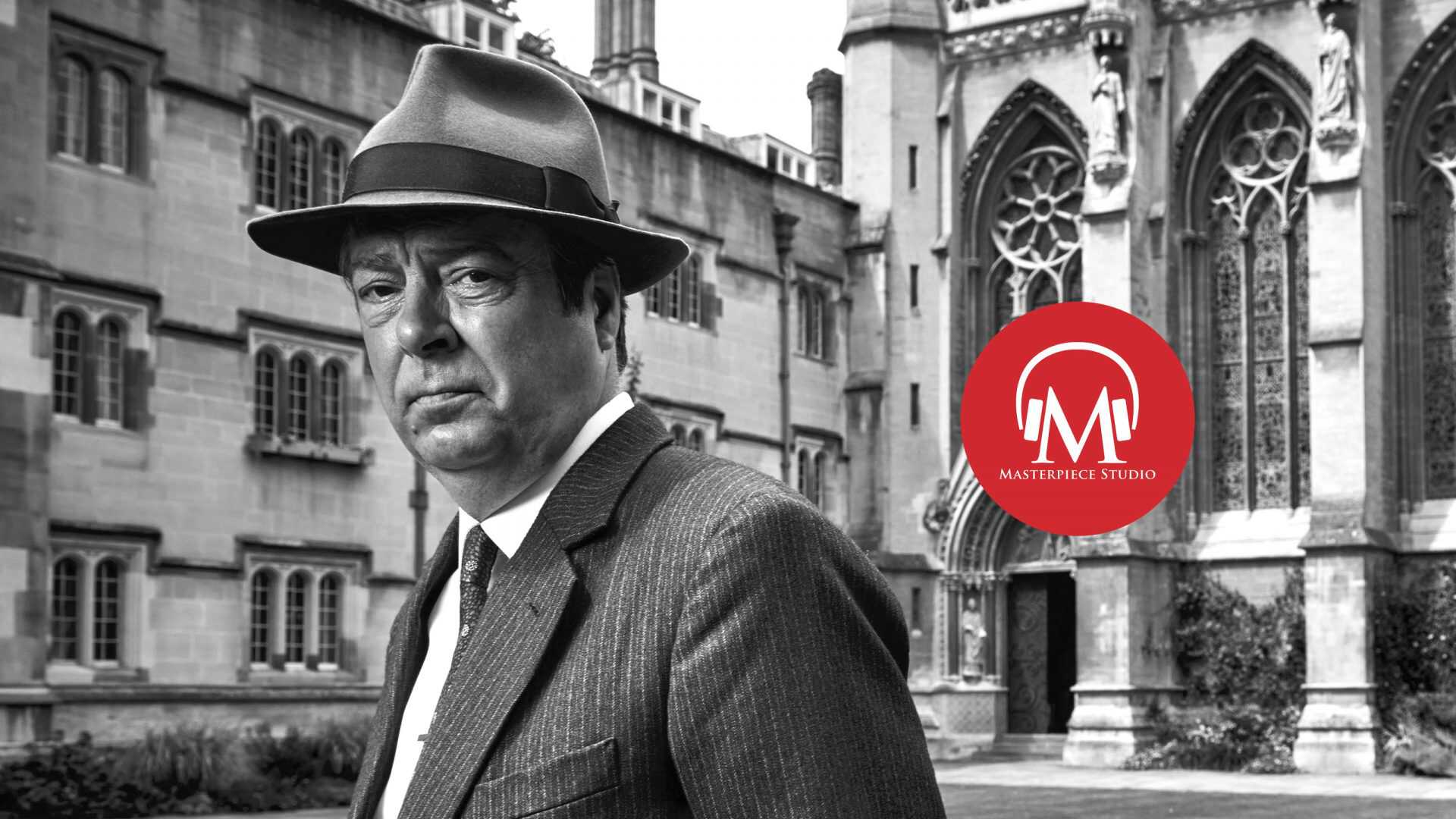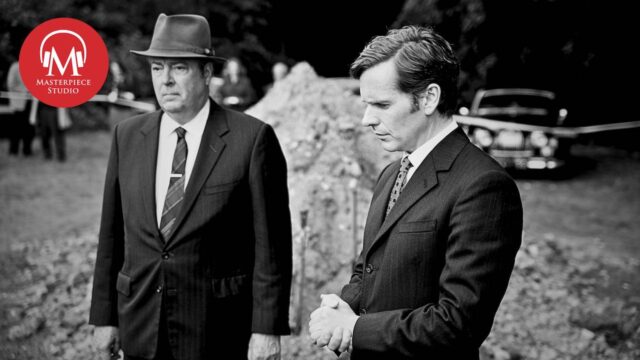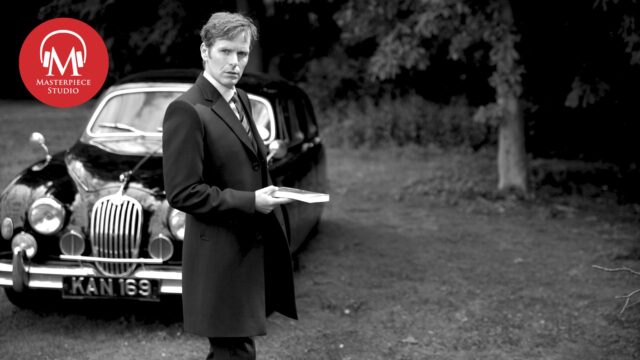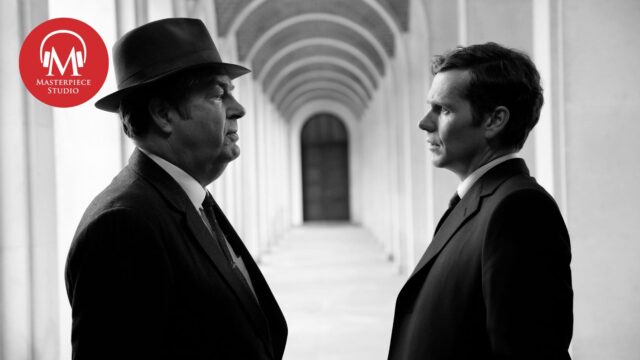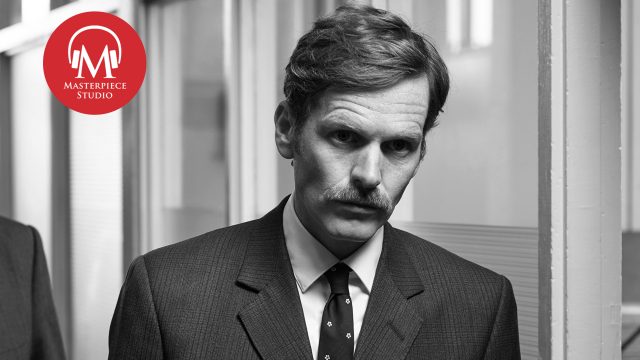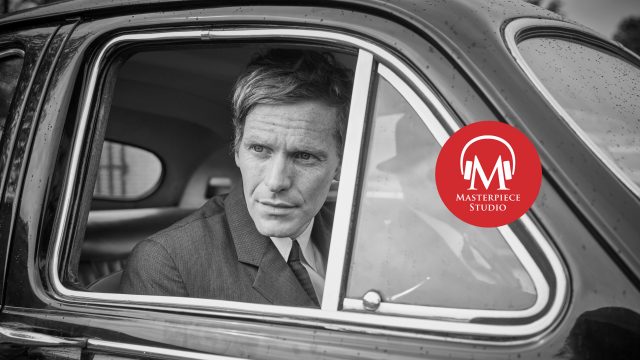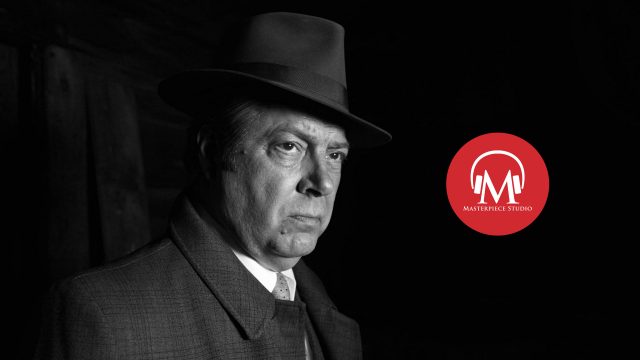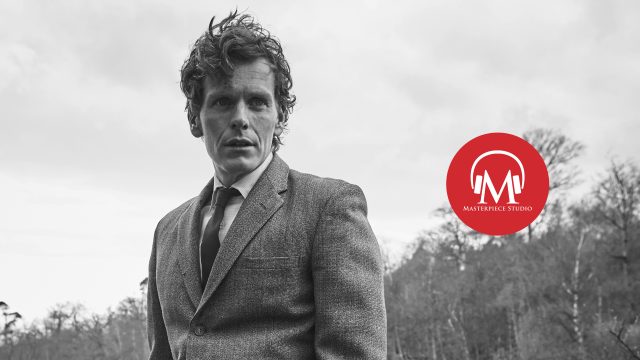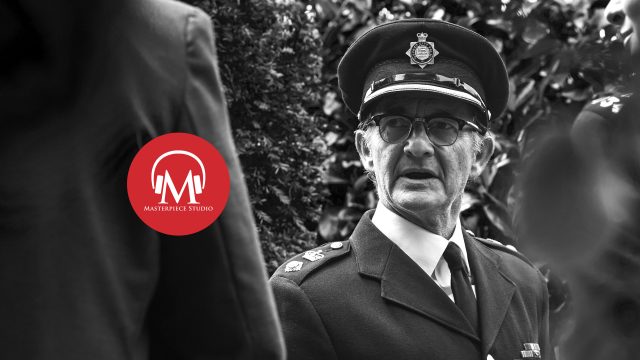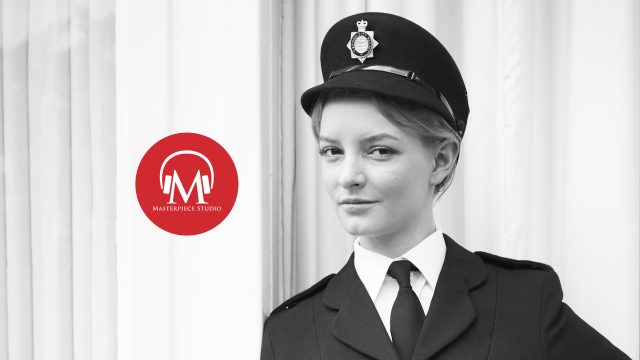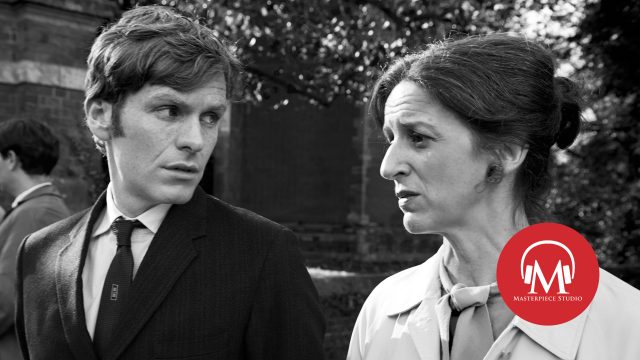Jace Lacob (Jace): MASTERPIECE Studio is brought to you by Audible. For a free trial, go to Audible.com/Masterpiece.
CLIP:
Doc: How are you?
Thursday: Right now, it’s not the state of my health that concerns me.
Jace: I’m Jace Lacob and you’re listening to MASTERPIECE Studio.
After being shot at the end of Season 2, Inspector Fred Thursday is back on the job with a hole in his lung and a lot on his mind…
Thursday, along with the rest of the Oxford City Police, is faced with solving a grisly fairground murder.
CLIP:
Jakes: Young woman found dead by Lake Silence yesterday morning. She attended the fair Thursday night.
Jace: At first, Thursday must navigate through smoke and mirrors without Morse by his side, as the moody detective struggles to come terms with everything that happened last season.
CLIP:
Morse: They put you in hospital and tried to frame me for murder.
Jace: But eventually, Thursday encourages Morse to look past his disillusionment, rejoin the force, and lend his detective’s instincts to the case at hand.
CLIP:
Roger Allam: …he perceives Morse as a really good detective but a poor policeman. Because Morse in a different way has his own impatience with the rules and the regulations.
Jace: Today on MASTERPIECE Studio, I sit down with Roger Allam to get the scoop on the third season premiere of Endeavour, and to learn what we can expect from the rest of the season.
This week we are joined by Roger Allam. Welcome.
Roger Allam (Roger): Hello.
Jace: Now, Endeavour is not your first time in the Morse universe. You were in the episode “Death is Now My Neighbor” where you played a college lecturer vying for the mastership of Lonsdale College, correct?
Roger: Well, you remember a great deal about it more than me (laughs). It was a very long time ago. Yes, but you’re quite right. Yes, I did. I can’t remember much about the story, to be honest.
Jace: I have the benefit of having gone back and watched it yesterday, so it’s fresh in my memory.
Roger: You have the advantage on me then.
Jace: What did you make of Detective Inspector Fred Thursday when you were first approached about the role?
Roger: I was hugely attracted to the character because to me he represented my father’s and my uncle’s and aunt’s generation, all of whom were sort of in their twenties or so in the Second World War, and whose parents and uncles fought in the First World War. So to me it was very much a looking back at that kind of generation. There was a lot for me to go on because of my own background with those kind of people really.
Jace: And coincidentally, your uncle and aunt were called “Fred” and “Win,” is that correct?
Roger: Yes, my father’s brother was called ‘Fred’ and his his youngest sister was called ‘Win.’ (Laughs)
Jace: That’s an amazing coincidence.
Roger: Yeah.
Jace: You were a teenager in 1967. How does the series reflect your own memories of the period.
Roger: Oh, I mean in so many ways: the cars, the fact that, you know, that here we are now talking… I’m in this not terribly nice place actually, where we’re filming — some abandoned military establishment — on a mobile phone talking to you in L.A.
And then of course, in 1967 if you were stuck in a field, you know, if your car had broken down on the road, you had absolutely no way of communicating easily and readily. You know, that is an absolutely fundamental change.
Also looking around certain sets like the set for my house, there are objects from different periods, you know which I remember in my own family, you know: furniture that might have been Edwardian; some stuff from the Second World War; maybe from a few new things from the ideal home exhibition or something like that, you know. So all the time really, I’m constantly reminded of it. The smell of petrol in the cars, (laughs) which you don’t get now, thank goodness. Everything.
Jace: What makes Thursday a good detective, do you feel?
Roger: Well, I think he’s got his feet on the ground. I think he…I think he knows a lot and remembers a lot and of course for… Again, having fought through the war, you know, in quite a physical way really. I mean, he joined a special operations unit later on is the kind of backstory Russell has invented for him. So I think he’s got a very sure moral sense formed by his experience of fighting through the war, you know. But he’s seen a lot, you know. For a lot of people of that generation, fighting abroad was the first time they’d ever left the country, so in that sense he’s got quite a broad experience of the world, but he’s still very firmly rooted in his home and in his family life.
Jace: Now Thursday was shot at the end of season 2. We see him back at work at Cowley in “Ride.” How has the shooting affected him in both a personal and professional sense?
Roger: Well, I mean, I think in in a personal way it was very serious, you know, he was lucky to pull through.
As we discover, a little fragment of bullet has been left in him and it could move, so it still could, as it were, kill him. It could still get him. So in his professional life, I suppose that he feels that threat professionally as well.
If you’ve experienced terrible things in war, I think you can have kind of flashbacks to them, they can haunt you for the rest of your life. And I think, a near death experience like that, it’s sort of — how can I put it — it’s a sort of route back to, if you like, the memories of violence in war. It sort of assists him in his losing his temper on occasions.
Jace: Now it’s Thursday who tracks down Endeavour at the cabin and convinces him to return to work at Cowley.
CLIP:
Thursday: We broke them. The worst are gone. What’s left: scattered in the forewinds. And I’m light one bagman.
Morse: Asks Jakes.
Thursday: Situation’s not vacant.
Jace: What does Thursday see in Endeavor and and does he realize that P.C. Morse is now more than just a bagman?
Roger: Oh I think he’s always thought that he was more than a bagman. I think Thursday’s interest in him was that he could see from the very start someone who has got a very different way of looking at crimes, a different way of thinking about it that would be a really, really useful man to have on your team. And I think he’s always seen that in Endeavour.
I think another thread that’s been going through the series is that he perceives Morse as a really good detective, but a poor policeman. Because Morse in a different way has his own impatience with the rules, and the regulations, and the box ticking, and stuff like that.
I think he thinks Endeavour is a really interesting and a really good man and there is a certain…there’s a certain father-son relationship going on, but there’s also a certain, kind of, comradely relationship going on; comrades from the, I suppose again a memory of the army that could throw very different groups of people together.
I think I’ve said enough about that now, haven’t I? (Laughs)
Jace: You have… I mean, much like acting, I think being, you know, put together with different people in a company…
Roger: Yes, absolutely. Yeah.
Jace: What is it like filming with Shaun Evans?
Roger: Well, we’ve got on very well from the start, you know, from however many years ago it is now. I think we’ve got to a very nice place where we can be serious about the work, but also have an enormous amount of fun.
Jace: There’s a beautiful scene in “Ride,” where Thursday and Morse sit at the Radcliffe Camera, and Thursday says, “Sometimes you have to put all you are against all they’ve got.”
CLIP:
Thursday: It was my decision. I’d do it again without a second thought. Don’t ever blame yourself.
Morse: If I’d been quicker off the mark.
Thursday: You were there at the end. Nobody else. You had the chance to run, to look to your own neck. You didn’t. You stood.
Jace: What was it like filming this very emotional scene in which there’s so much that either man won’t say?
Roger: I’m just trying to think…Where we when we were filming that?
Jace: That’s in the first episode at the Radcliffe Camera, on the bench. You’re having a sandwich.
Roger: It was absolutely freezing cold. That’s what I remember about filming that. It was achingly cold, and no sane person — even in this country — would have sat on a bench eating a sandwich.
But it’s interesting you say that line actually because of course that’s…I think for him, he owes Morse his life, you know, because of that. And so they’re sort of very, very bonded from a moment like that.
And you’re right to point out from what is not said because a lot of the time we constantly talk about what isn’t being said; sometimes things have to be freighted, have to bear the load if you like of what isn’t being said as well. And again, I remember people from that generation in England, who kind of…not being able to unburden their feelings very easily, so that when they do, it is very powerful.
Jace: Do you have a favorite scene or episode of Endeavour from the ones you’ve shot thus far?
Roger: Oh, quite a lot really. I mean, you know, whenever I get the chance to pay homage to I don’t know Clint Eastwood or Humphrey Bogart…not that the not that the audience would necessarily know of course but it gives me the most enormous infantile pleasure.
That is just the most enormous fun, you know, doing stuff like that. And also, you know, as well as being serious. I guess that’s what I talk about all the time: that it’s serious and it’s fun. That’s what’s one of the most pleasurable things about acting really. Even the most terrible tragedy is a weird kind of fun.
Jace: You were recently quoted as saying that the arts are have become elitist. What did the theatre offer you as a teenager that is not possible for young people today?
Roger: Well when I was a teenager, I discovered, sort of by accident, the National Theater when they were still at The Old Vic and being run by Laurence Olivier. And in those days — this would be about 1971 or 2 — you could stand in the gallery for 10 pence and you could sit in the gallery for 15 pence on a padded bench, and 15 pence was about the price of a tube fare. And that isn’t available to young people now.
So in that sense, the arts are veering away because the country is so different now. I mean, when I’m talking about the period of Laurence Olivier at the National Theatre, that is a period in which there was no private sponsorship of the arts in this country. It was either commercial or it was publically subsidized. There are good things about either system, but I think it’s more…If people are excluded from…in terms, literally just in terms of the price of something, then it’s becoming elitist.
Jace: Now your IMDB page is I don’t know a kilometer long at this point. What role are you most often recognized for on the street? Is it Fred Thursday these days?
Roger: I think it depends, you know. I either get recognized for Fred Thursday or I get recognized for The Thick of It, Peter Mannion in The Thick of It. People stop me about that sometimes. I also get stopped sometimes for a radio program I did, a radio comedy called Cabin Pressure, which was absolutely a glorious comedy which has got a kind of world wide following, partly because Benedict Cumberbatch was in it, but it sort of developed that before Benedict Cumberbatch became incredibly famous. And I sometimes also get stopped for a children’s program called Sarah And Duck, in which…a cartoon program in which I play the disembodied voice of the narrator. Sometimes people come up to me and say, “My daughter would be so thrilled if you could just record into my phone “Sarah and Duck.”
So it’s a nice mix of things, really. And of course, you know, if you’re wandering around London and people come up and say oh, “I really like that,” or “I like that,” they generally…you know, people say very nice things and it makes you feel generally optimistic about the world and your day, you know.
Jace: You’ve known fellow Shakespearean actor Anton Lesser for years. What have you two been up to between scenes?
Roger: Laughing and laughing and laughing, and gossiping and gossiping and gossiping. I think that’s…Yes. We like to think that that’s what we’re paid for really, and we throw the acting in for free.
No it’s an enormous pleasure. I first saw Anton, oh, going over 40 years ago really, when I when I was literally just starting. And we’d both been in and out of the Royal Shakespeare Company at different times and together, and the National Theatre. Although, we’ve never been on the stage together, which is curious, but been around each other’s work a great deal. So it’s just such a pleasure to work with him.
Jace: As someone who’s been in not one but two of the Oxford Trilogy series, what do you think what do you think the popularity of Morse as a character endure?
Roger: I think it’s, you know, I think there’s a general thing that people know that the world is difficult and that terrible things happen, but they always like to see the detective who’s trying to put things right, or at the very least trying to find out what went wrong. And the particularity I think of Endeavour, is that he’s clearly very bright, you know. And he sticks at it. Things don’t go well for him. But he carries on, if you like, endeavoring.
Jace: Next week, Endeavour welcomes a new character to the show, Woman Police Constable Shirley Trewlove…
She’s smart, she’s hardworking, and she’s an upcoming guest on the MASTERPIECE Studio podcast:
CLIP:
Dakota Blue Richards: …she is really the only female officer that has ever had even a line on Endeavour, so it’s quite a big step for the show.
Jace: Monday, tune into the podcast to hear about Dakota Blue Richards’ first days on the set of Endeavour, and her character’s first days on the job.
You can listen to future episodes of MASTERPIECE Studio at pbs.org/masterpiece or you can download and even subscribe to the show by finding us on iTunes or Stitcher.
MASTERPIECE Studio is hosted by me, Jace Lacob and produced by Rachel Aronoff. Kathy Tu is our editor. Special thanks to Barrett Brountas and Nathan Tobey. The executive producer of MASTERPIECE is Rebecca Eaton.
MASTERPIECE Studio is brought to you by Audible.
Sponsors for MASTERPIECE on PBS are Viking River Cruises, Audible, and The MASTERPIECE Trust.








